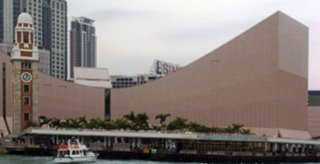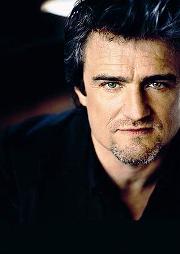Hong Kong Arts Festival Ends on a High Note!
By Paul E. Robinson
Classical Travels
THIS WEEK IN HONG KONG

The 37th annual Hong Kong Arts Festival ended this week after a very busy month which featured 125 performances and eight world premieres. The organizers reported that the average attendance was a very healthy 94%. There was lots of dance and theatre – a Peter Hall production of Pygmalion was among the highlights – but many more musical events. No fewer than four orchestras were invited this year: the Chicago Symphony (Haitink), the Northern Sinfonia, the Amsterdam Baroque Orchestra (Koopman) and the Deutsches Symphonie-Orchester Berlin (Metzmacher). I arrived in Hong Kong just in time to hear the last of these ensembles, and its two concerts were a mixed bag.
Sound and Interpretation Problematic in Metzmacher’s Bruckner
 The Deutsches Symphonie-Orchester (DSO) Berlin played in the Hong Kong Cultural Centre, a hall seating about 2,000 in a circle surrounding the performers. From my balcony seat, the orchestra had lots of presence and the reverberation was reasonably long and quite flattering; however, the best acoustics in the world don’t help much when the air conditioning system is so noisy.
The Deutsches Symphonie-Orchester (DSO) Berlin played in the Hong Kong Cultural Centre, a hall seating about 2,000 in a circle surrounding the performers. From my balcony seat, the orchestra had lots of presence and the reverberation was reasonably long and quite flattering; however, the best acoustics in the world don’t help much when the air conditioning system is so noisy.
Ingo Metzmacher opened the first concert with the Prelude to Act I of Wagner’s Lohengrin and the soft upper string lines at the beginning of the piece were almost inaudible. The same thing happened at the beginning of Bruckner’s Seventh Symphony later in the evening. Something needs to be done about this problem or world-class performers will simply find excuses to avoid Hong Kong.
I have long admired the DSO Berlin, as far back as the days when it was called the RIAS Symphony under Ferenc Fricsay. More recently, Kent Nagano was the music director and to judge by the recordings, he got excellent results. On this occasion, there was no doubt about the very high quality of the orchestra and I heard some especially fine horn and double bass playing.
Metzmacher is more problematic than his orchestra. His leadership was impressive in Webern’s Passacaglia and the Berg Violin Concerto with Christian Tetzlaff, but his Bruckner was disappointing.
There is a formidable tradition of Bruckner conducting from Furtwängler through Jochum, Böhm, Karajan and Tennstedt; for such conductors, Bruckner not only created monumental musical structures, but also sought to express deep thoughts about his religious faith. For Metzmacher, Bruckner is apparently a less gifted relative of Carl Maria von Weber. To put it another way, this was ‘Bruckner Lite’ - one trivial rustic tune after another, with no depth of feeling whatsoever.
Metzmacher hurried through the Seventh Symphony as if he had a plane to catch. Climaxes in the middle of the slow movement and at the end of the first and last movements never came close to the ecstatic heights the music requires. With this kind of conducting, Bruckner’s music will soon disappear from the repertoire.
When Metzmacher turned to Brahms’ Fourth Symphony, he conducted with more fire, but again there was a decided lack of flexibility and poetry. In both major symphonies, Metzmacher seemed to think that loud endings are crude and vulgar. He went out of his way to make the last chords actually less powerful than what had come before. Instead of avoiding vulgarity, the effect was to make the endings anti-climactic and unsatisfying.
Soloists Struggle with Hall Acoustics
 Another major problem in the first concert was baritone Matthias Goerne. He has gained a well-earned reputation as a lieder singer. Perhaps he was indisposed on this night, because he was virtually inaudible through much of Mahler’s Kindertotenlieder. He also seemed to have trouble sustaining phrases.
Another major problem in the first concert was baritone Matthias Goerne. He has gained a well-earned reputation as a lieder singer. Perhaps he was indisposed on this night, because he was virtually inaudible through much of Mahler’s Kindertotenlieder. He also seemed to have trouble sustaining phrases.
Guest violinist Christian Tetzlaff also seemed to struggle to be heard in the Berg concerto. As does Goerne, Tetzlaff spends a good deal of time playing in the realm of sotto voce; this is very dangerous territory for a soloist when a big orchestra is at work behind him in a less than ideal hall.
Objectively speaking, the acoustics in the HK Cultural Centre could have been to blame for some of these auditory problems.
Metzmacher Takes ‘Encore’ Literally!
Curiously, as an ‘encore’ after the Bruckner at the first of the DSO Berlin concert, Metzmacher repeated the Wagner Lohengrin Prelude he had used to open the concert. What was the point? To remind us how much Bruckner was indebted to Wagner? Or perhaps to remind us how effectively the air conditioning noise had drowned out the soft opening of the piece at its first playing? I don’t think I was the only audience member who would rather have heard some other music.
Hong Kong Cultural Centre Architecturally Bland
I will have to reserve judgment on the acoustics of the HK Cultural Centre, having heard only two concerts from pretty much the same seats; on the other hand, I have no doubt whatsoever about the architecture of the place. While the site chosen for the Centre is surely one of the best locations in Hong Kong – right next to the Star Ferry dock in Kowloon with a fantastic view of Hong Kong, especially at night – the building itself is hideous beyond belief. Basically, it is a beige wall of bricks with no windows and no imaginative embellishment to break up the ugly emptiness. The nearby Hong Kong Space Museum and the Hong Kong Museum of Art are equally uninspired structures.
The interior of the Cultural Centre, happily, is a feast for the eyes, fairly overflowing with colorful posters of productions past and present, contemporary art exhibits, and performance videos.
Hong Kong Philharmonic to Perform Later this Month
I will be back at the HK Cultural Centre in a few weeks time to hear a concert by the HK Philharmonic. I look forward to hearing how the orchestra has evolved from the semi-professional band I knew forty years ago – I actually played double bass in the HKPO for a short period – into the fully professional ensemble headed today by the eminent Edo de Waart.
Paul E. Robinson is the author of Herbert von Karajan: the Maestro as Superstar and Sir Georg Solti: his Life and Music, both available at http://www.amazon.com.
 Classical Music Blogs
Classical Music Blogs 
Classical Travels
THIS WEEK IN HONG KONG

The 37th annual Hong Kong Arts Festival ended this week after a very busy month which featured 125 performances and eight world premieres. The organizers reported that the average attendance was a very healthy 94%. There was lots of dance and theatre – a Peter Hall production of Pygmalion was among the highlights – but many more musical events. No fewer than four orchestras were invited this year: the Chicago Symphony (Haitink), the Northern Sinfonia, the Amsterdam Baroque Orchestra (Koopman) and the Deutsches Symphonie-Orchester Berlin (Metzmacher). I arrived in Hong Kong just in time to hear the last of these ensembles, and its two concerts were a mixed bag.
Sound and Interpretation Problematic in Metzmacher’s Bruckner
 The Deutsches Symphonie-Orchester (DSO) Berlin played in the Hong Kong Cultural Centre, a hall seating about 2,000 in a circle surrounding the performers. From my balcony seat, the orchestra had lots of presence and the reverberation was reasonably long and quite flattering; however, the best acoustics in the world don’t help much when the air conditioning system is so noisy.
The Deutsches Symphonie-Orchester (DSO) Berlin played in the Hong Kong Cultural Centre, a hall seating about 2,000 in a circle surrounding the performers. From my balcony seat, the orchestra had lots of presence and the reverberation was reasonably long and quite flattering; however, the best acoustics in the world don’t help much when the air conditioning system is so noisy.Ingo Metzmacher opened the first concert with the Prelude to Act I of Wagner’s Lohengrin and the soft upper string lines at the beginning of the piece were almost inaudible. The same thing happened at the beginning of Bruckner’s Seventh Symphony later in the evening. Something needs to be done about this problem or world-class performers will simply find excuses to avoid Hong Kong.
I have long admired the DSO Berlin, as far back as the days when it was called the RIAS Symphony under Ferenc Fricsay. More recently, Kent Nagano was the music director and to judge by the recordings, he got excellent results. On this occasion, there was no doubt about the very high quality of the orchestra and I heard some especially fine horn and double bass playing.
Metzmacher is more problematic than his orchestra. His leadership was impressive in Webern’s Passacaglia and the Berg Violin Concerto with Christian Tetzlaff, but his Bruckner was disappointing.
There is a formidable tradition of Bruckner conducting from Furtwängler through Jochum, Böhm, Karajan and Tennstedt; for such conductors, Bruckner not only created monumental musical structures, but also sought to express deep thoughts about his religious faith. For Metzmacher, Bruckner is apparently a less gifted relative of Carl Maria von Weber. To put it another way, this was ‘Bruckner Lite’ - one trivial rustic tune after another, with no depth of feeling whatsoever.
Metzmacher hurried through the Seventh Symphony as if he had a plane to catch. Climaxes in the middle of the slow movement and at the end of the first and last movements never came close to the ecstatic heights the music requires. With this kind of conducting, Bruckner’s music will soon disappear from the repertoire.
When Metzmacher turned to Brahms’ Fourth Symphony, he conducted with more fire, but again there was a decided lack of flexibility and poetry. In both major symphonies, Metzmacher seemed to think that loud endings are crude and vulgar. He went out of his way to make the last chords actually less powerful than what had come before. Instead of avoiding vulgarity, the effect was to make the endings anti-climactic and unsatisfying.
Soloists Struggle with Hall Acoustics
 Another major problem in the first concert was baritone Matthias Goerne. He has gained a well-earned reputation as a lieder singer. Perhaps he was indisposed on this night, because he was virtually inaudible through much of Mahler’s Kindertotenlieder. He also seemed to have trouble sustaining phrases.
Another major problem in the first concert was baritone Matthias Goerne. He has gained a well-earned reputation as a lieder singer. Perhaps he was indisposed on this night, because he was virtually inaudible through much of Mahler’s Kindertotenlieder. He also seemed to have trouble sustaining phrases.Guest violinist Christian Tetzlaff also seemed to struggle to be heard in the Berg concerto. As does Goerne, Tetzlaff spends a good deal of time playing in the realm of sotto voce; this is very dangerous territory for a soloist when a big orchestra is at work behind him in a less than ideal hall.
Objectively speaking, the acoustics in the HK Cultural Centre could have been to blame for some of these auditory problems.
Metzmacher Takes ‘Encore’ Literally!
Curiously, as an ‘encore’ after the Bruckner at the first of the DSO Berlin concert, Metzmacher repeated the Wagner Lohengrin Prelude he had used to open the concert. What was the point? To remind us how much Bruckner was indebted to Wagner? Or perhaps to remind us how effectively the air conditioning noise had drowned out the soft opening of the piece at its first playing? I don’t think I was the only audience member who would rather have heard some other music.
Hong Kong Cultural Centre Architecturally Bland
I will have to reserve judgment on the acoustics of the HK Cultural Centre, having heard only two concerts from pretty much the same seats; on the other hand, I have no doubt whatsoever about the architecture of the place. While the site chosen for the Centre is surely one of the best locations in Hong Kong – right next to the Star Ferry dock in Kowloon with a fantastic view of Hong Kong, especially at night – the building itself is hideous beyond belief. Basically, it is a beige wall of bricks with no windows and no imaginative embellishment to break up the ugly emptiness. The nearby Hong Kong Space Museum and the Hong Kong Museum of Art are equally uninspired structures.
The interior of the Cultural Centre, happily, is a feast for the eyes, fairly overflowing with colorful posters of productions past and present, contemporary art exhibits, and performance videos.
Hong Kong Philharmonic to Perform Later this Month
I will be back at the HK Cultural Centre in a few weeks time to hear a concert by the HK Philharmonic. I look forward to hearing how the orchestra has evolved from the semi-professional band I knew forty years ago – I actually played double bass in the HKPO for a short period – into the fully professional ensemble headed today by the eminent Edo de Waart.
Paul E. Robinson is the author of Herbert von Karajan: the Maestro as Superstar and Sir Georg Solti: his Life and Music, both available at http://www.amazon.com.

Labels: classical music, Deutsches Symphonie-Orchester Berlin (DSO), Hong Kong, Ingo Metzmacher



